Rescuing Africa’s Vulnerable—Part 1
Rescuing Africa’s Vulnerable in Jesus’ Name—Part 1
Story by Margot Bass, Rachel Ayele, and Jessica Russell
Photos Courtesy of ESMAfrica
This is Part 1 of a two-part story about Ebenezer Shepherding Ministries of Africa (ESMAfrica). Look for Part 2, which will focus on the ministry’s origins and community outreach, tomorrow. Calvary Chapel Magazine first reported on this ministry in 2013, Issue 57.
Lemlem Asseffa, pregnant with her sixth child, knew that her blood pressure was dangerously high. But with so many other mouths to feed, she felt there was no time to heed the doctor’s warning. She recalled, “[One night] I went to sleep; when I woke up in the morning, I found myself as I am now.” At age 33, a stroke had ravaged Lemlem’s body. Half-paralyzed, she could no longer care for her family or work to bring in income. And then her husband left.
Lemlem, from south-central Ethiopia, cried as she explained, “Whatever I had, I sold cheap. I just cared to have something for my children. I lived like that for 2½ years.” Then someone shared her plight with Argaw and Rachel Ayele, founders of Ebenezer Shepherding Ministries of Africa (ESMAfrica) in Hawassa, Ethiopia. Their hearts touched, they decided to make Lemlem’s problems their own, providing financial support, friendship, and meals. They matched her with a physical therapist, and Lemlem recovered some movement and began learning to walk again. Today, Lemlem is doing well, Rachel shared. Her children are all in school, including one daughter currently attending university. With wonder in her voice, Lemlem exclaimed, “Who would do this [for us] except God?”
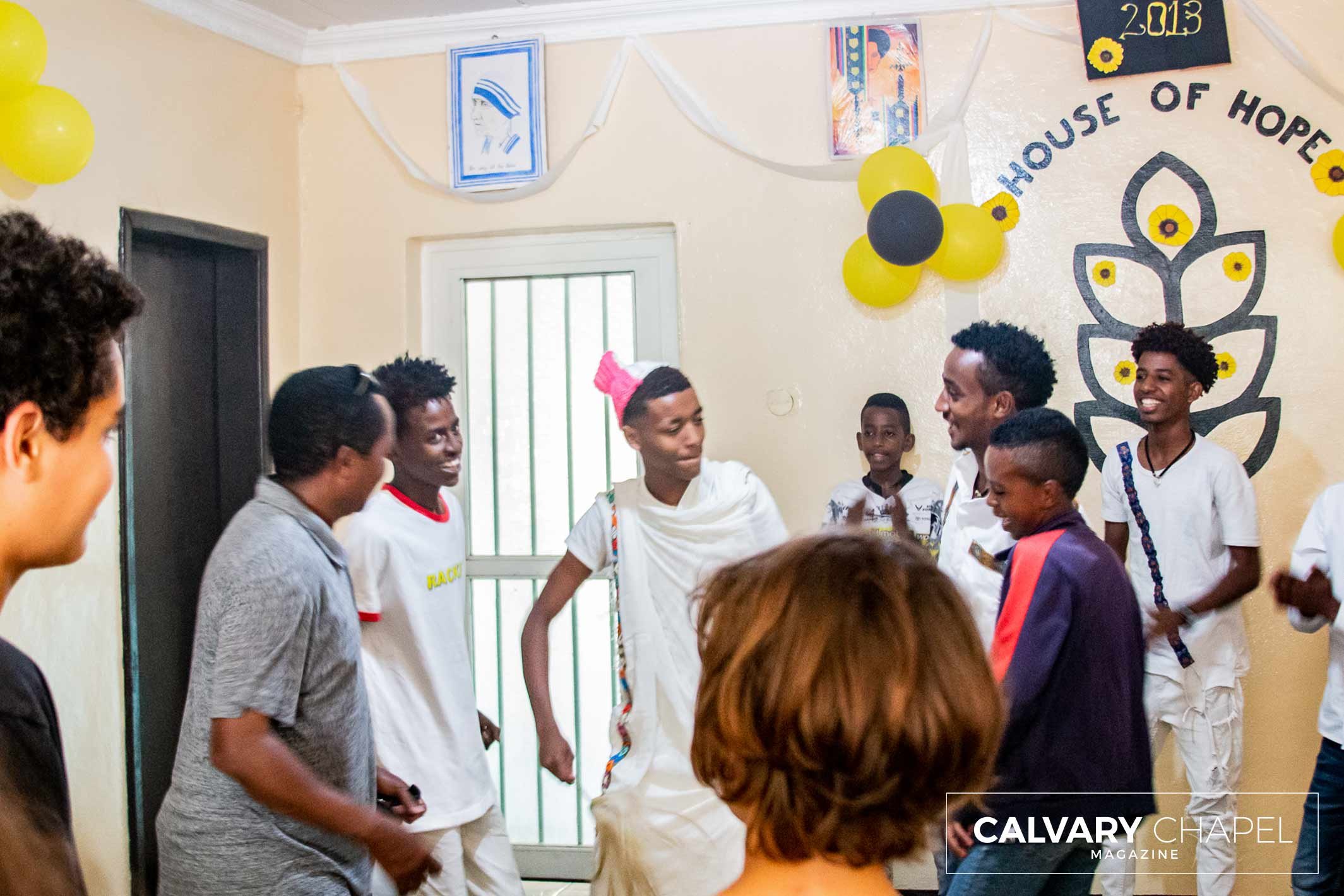
Argaw Ayele dances with the older boys from House of Hope at a recent Ethiopian New Year's party.
Argaw marveled, “It’s amazing to help a family stay together. Lemlem is courageous and has a soft heart. She pokes my heart … how she is so appreciative for what we have done [for] her. That shows me how much I should be appreciative for what God has done for us.”
Lemlem’s story is just one of many from a ministry that actively puts flesh on the Gospel of Jesus Christ, rescuing vulnerable children and helping impoverished families.
Argaw and Rachel met at Calvary Chapel Bible College Europe (in Hungary), married, and became missionaries in his native homeland of south-central Ethiopia after he graduated from the internship program in 2005. In 2010, they opened their first orphanage, Ebenezer Grace Children’s Home (EGCH). Today there are two more homes: one for those in dire need of specialized care and another for older boys, many of whom are HIV-positive. Together, the three currently house 85 children.
Ebenezer: “Stone of Help”
Learn to do good; seek justice, rebuke the oppressor; defend the fatherless, plead for the widow. Isaiah 1:17
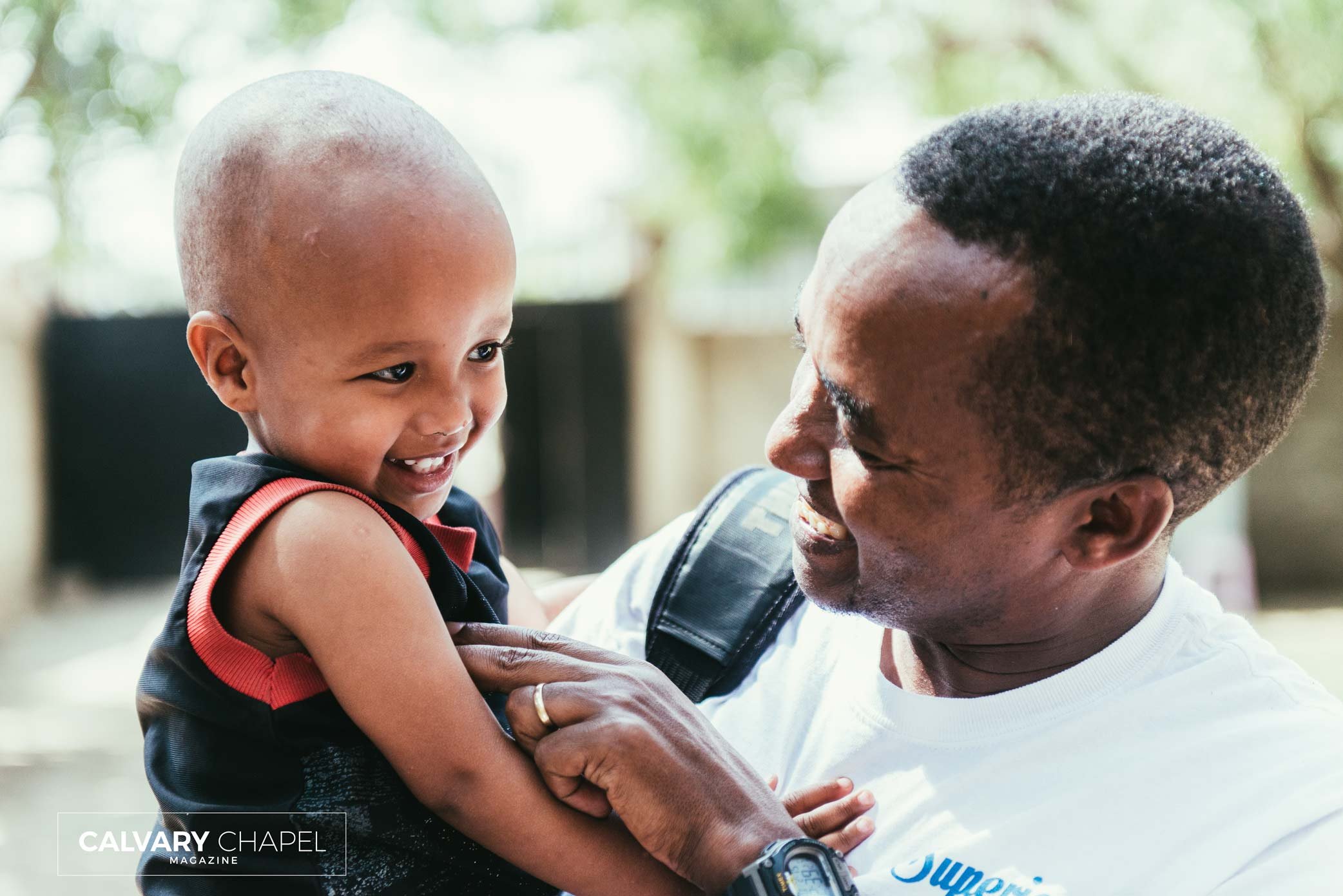
Argaw tickles one of the kids at Ebenezer Grace Children’s Home.
ESMAfrica is a non-profit organization sharing the love of Christ with the people of Africa by providing housing, food, education, spiritual encouragement, and love for orphans and vulnerable children. The ministry also helps poverty-stricken families become self-supporting, with funding partly from sponsorship programs for children, families, and individuals.
More than 50 Ethiopian nationals work as employees in the ministry, loving and serving the children at each of the homes. Rachel said, “From the practical duties of ordering and preparing food to providing clean laundry; caring for sick kids to changing diapers; making sure the kids take naps to singing songs together … they demonstrate a willingness and care that is invaluable and selfless. This is more than a job for any of us. By God’s grace, this has become a collective sub-culture of compassion.”
Ebenezer means “stone of help,” Rachel noted. Then Samuel took a stone and set it up between Mizpah and Shen, and called its name Ebenezer, saying, “Thus far the LORD has helped us” (1 Samuel 7:12).
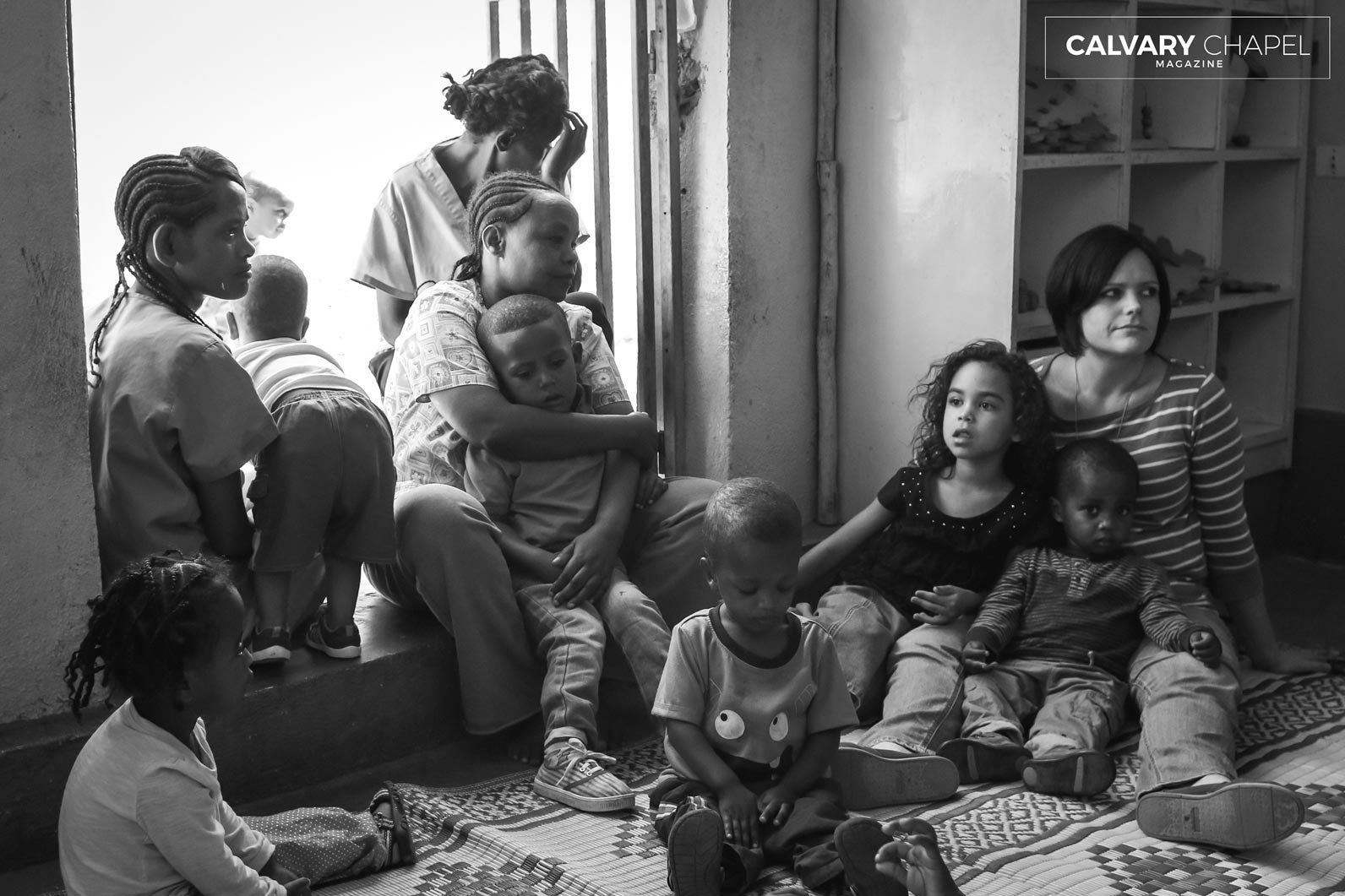
Rachel spends time with the mamas (caretakers) and their children at Ebenezer Grace Children’s Home.
“These children come from various backgrounds, tribes, and subcultures. Some are counted as ‘cursed’ according to tribal conditions—even condemned to a death sentence. Others were abandoned as infants,” Rachel expounded. “Regardless of their history, we believe that God gave each [one] value and has a future for each child. We are thankful that … we have the opportunity to be a part of their story, and for them to become part of our family.” They also desire to raise rescued children to know Jesus and to encourage them to return to their villages as missionaries.
Marta is one of the native Hamar children; now 18, she has been in the ESMAfrica family for years. “I had to attend a traditional ceremony to participate in a ritual practice. I didn’t make it because of rain and flooding, so I immediately became a mingi (ritually polluted or cursed). My mother sent me away from the village, and my aunt brought me to Ebenezer,” Marta reflected. “One of the things I cannot forget was when we arrived at the house. It was amazing—it looked like a hotel. They put me in a very good school and bought me everything I needed.” She has become more confident and has grown in her faith. “What I want in my life is to teach and to help people know God,” she declared with a big smile.
Shaun and Megan Havelaar, who served with the ministry for six years in Hawassa, emphasized that Marta’s mother literally saved her life by forcing her out of the village—that these children may not realize that their parents love them. Megan added, choking up, “I just hope that someday she’ll be able to know that and feel [her parents’] love.”
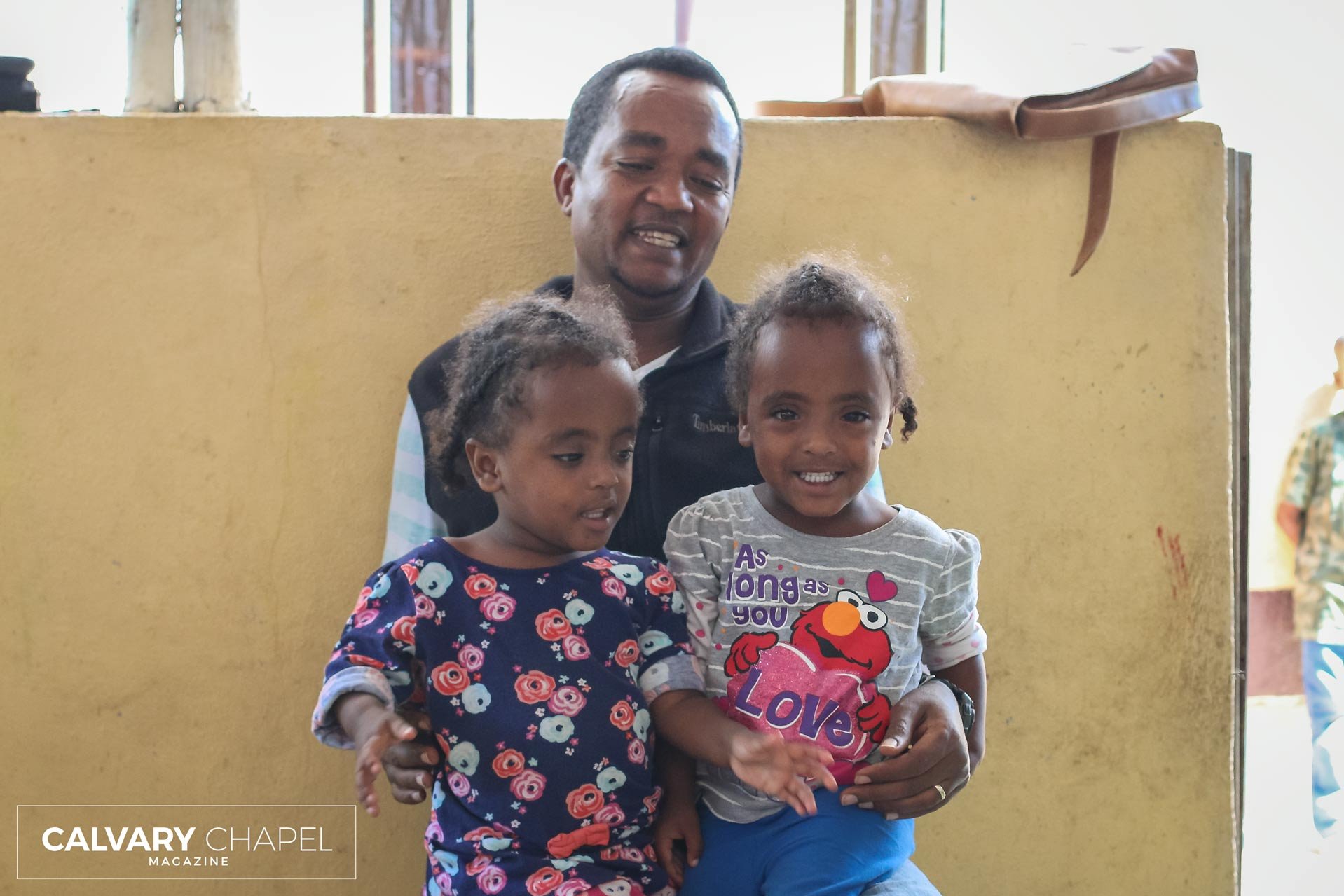
Argaw holds twin girls on his lap.
Lantu’s Story
Lantu Legesse was the first child to call EGCH “home” in 2010. At 5 years old, she arrived at the orphanage weighing only 17 pounds. She was born with pulmonary hypertension, a condition considered inoperable because her lung pressure was abnormally high. Lantu was also 80% blind, severely malnourished, and unable to walk. After one month at EGCH, she could walk. Later she learned to speak three languages, including English. The Ayeles, who have five biological children, moved Lantu into their home.
Lantu died in October 2014. “During her 4 ½ years with us, she came to know Jesus, and became a living testimony of God’s strength and ability,” Rachel reminisced. Her favorite song was “Open the Eyes of My Heart.” One year after her death, the ministry opened its second home, Lantu’s Home of Hidden Treasures, to help children in need of specialized care.
A father of the fatherless, a defender of widows, is God in His holy habitation. God sets the solitary in families; He brings out those who are bound into prosperity. Psalm 68:5-6a
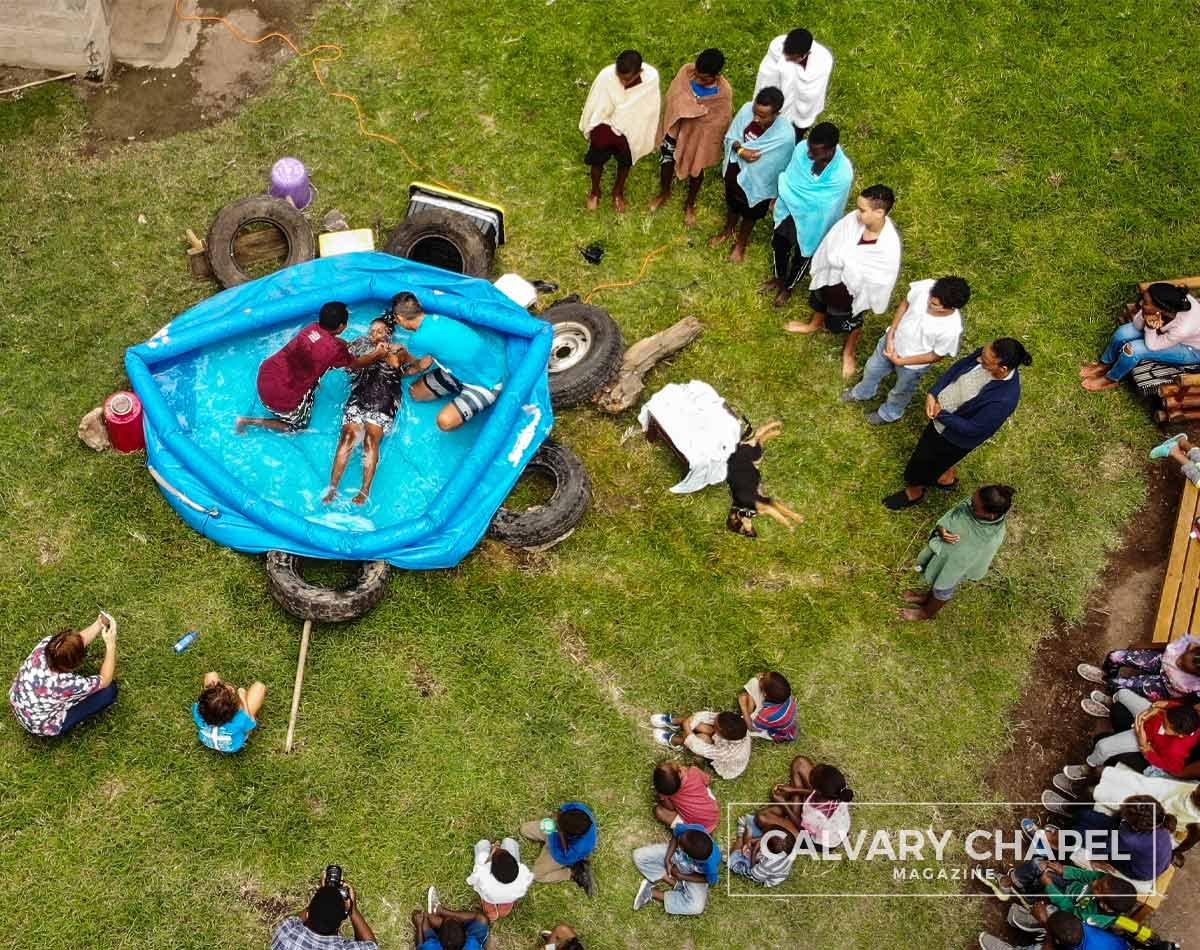
Argaw baptizes a new believer.
A Family Focus
Rachel emphasized, “Our hope is that each child who comes through our doors will become part of a family,” either being adopted or reunited with their families. Over the last 10 years, the ministry has facilitated 22 local and seven international adoptions and has assisted in 28 different family reunifications. To combat the problem of child abandonment, ESMAfrica takes in the mother with the children whenever possible.
Rachel continued, “In the past, we have provided job and educational opportunities for mothers and fathers, as well as transitional support when mothers step out to raise their children on their own. Unfortunately, it’s not a failproof plan. We’ve lost contact with some, and some came and left without their child. Love does not lose hope … as we seek to provide each with the opportunity to be a family.”

Rachel comforts one of the little girls with hydrocephaly at Lantu's Home.
Brothers Mebratom and Tesfa joined the Ebenezer family four years ago—they had been living on the streets with their mentally ill mother Mebrat and then taken from her by the government. Rachel remarked, “We‘ve kept tabs on Mebrat throughout the years and heard stories about her asking where her children were. Her older son Mebratom had asked to visit his mother in the summer like some of the other kids get to do with their families. We never told him why he couldn’t visit her, but it broke our hearts to see his desire to be with her again.” Recently, the Ayeles contacted government officials in Mebrat’s town, asking if they could help her regain her mental health. They arranged her trip back, a 16-hour drive, for a month of psychiatric treatment.
“The doctor told us to bring her kids so she could see them. She was so grateful to see they were alive and well. We asked her if she’d want to come and live at Ebenezer with them, and she agreed. Mebrat is now living at Lantu’s Home and is able to see her boys every day,” Rachel recounted. “These kids now have their mother, [who is] still receiving treatment, back. They will be able to grow their relationship with her. We also believe that ESMAfrica will be able to give Mebrat not only the financial support she needs to live, but also the mental, emotional, and spiritual support she’s lived so long without.”
This is Part 1 of a two-part story. Look for Part 2, which will focus on ESMAfrica’s origins and community outreach, tomorrow. Calvary Chapel Magazine first reported on this ministry in 2013, Issue 57. ESMAfrica is the 501(c)(3) in the States that sends support to the ministry. In Ethiopia, the ministry is called Ebenezer Supporting and Development Association (ESDA).
All verses above are quoted from the New King James Version.
© 2020 Calvary Chapel Magazine. All rights reserved. Articles or photographs may not be reproduced without the written permission of CCM. All Scripture quotations, unless otherwise indicated, are taken from the New King James Version. Copyright © 1982 by Thomas Nelson, Inc.® Used by permission.

